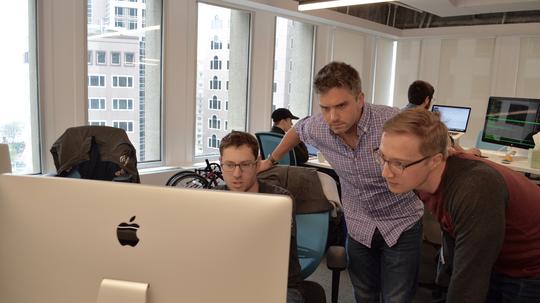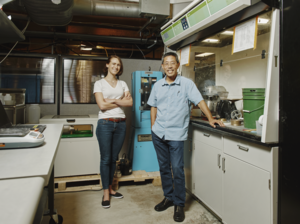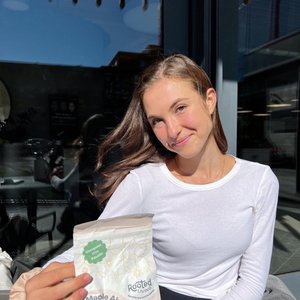
If you hadn't heard of Klaviyo (pronounced "clay-veeyo"), we wouldn't blame you.
After raising a $1.5 million seed round in 2015, the email marketing automation startup has been fairly quiet ever since — so much so that it never even announced the $7 million Series A round it raised early last year from Astral Capital, a venture capital firm founded by former Accomplice partner Jon Karlen. The company's name didn't even appear on its mandatory filing with the U.S. Securities and Exchange Commission. The filing's only clue were the letters "ABEH," the initials of Klaviyo's founders: Andrew Bialecki and Ed Hallen.
If that seems pretty quiet for a marketing company, that's because Bialecki, Hallen and their 80 employees have mostly been keeping their heads down to grow a profitable business with over 3,500 customers that has tripled annual revenue in the last two years, now in the eight figures. With the goal of making a sustainable, enduring company, Klaviyo has largely been able to support its own growth, only using a portion of its investors' money for a down payment on the company's 25,000-square-foot downtown headquarters. (All of these details have been confirmed by the company.)
"They're the hottest company no one knows about."
But despite Klaviyo's success so far, the company knows it can no longer be quiet. One of its more significant competitors, MailChimp, had a big, splashy feature in The New York Times last fall — not to mention the viral "Mailkimp" ad from the popular "Serial" podcast.
"They're the hottest company no one knows about," says TJ Mahony, an early Klaviyo investor and venture partner at Cambridge venture capital firm Accomplice.
'We built something that's like Microsoft Word to them'
Andrew Bialecki says there's one thing he notices a lot with Klaviyo customers.
"It's not uncommon to spend 10, 20, 30 hours a week in our software, and you think about it, it's like, 'oh my gosh, we built something that's like Microsoft Word to them,'" he says from his Boston office on Franklin Street.
While an email marketing automation tool like MailChimp has a broad range of uses, Klaviyo solely focuses on ecommerce companies, more specifically ones that have limited marketing budgets and a need to interact with customers in a data-driven, custom-tailored way to increase sales. With Amazon and Walmart eating up a large market share of online purchasing, Klaviyo aims to give smaller companies a fighting chance.
"Oh my gosh, we built something that's like Microsoft Word to them."
Using data from ecommerce platforms like Shopify — integration only takes one click, Bialecki says — the software "pre-builds" a number of custom email templates companies can automatically send out based on different kinds of transactions, behaviors and events. That includes things like when someone abandons an item in their shopping cart, what kind of products they're buying or if a customer is new to the site.
"The thing that fundamentally sets us apart from a product perspective is that we are better at getting all of the data into one place and actually making it usable from a marketing perspective," says Agata Celmerowski, Klaviyo's vice president of marketing.
Klaviyo's customers pay anywhere from $25 to tens of thousands of dollars a month, and the company says they generate hundreds of millions of dollars in sales each quarter using Klaviyo. One of its customers, Nomad, increased revenue from email marketing from 2-20 percent of overall sales, giving it a 14x return on investment for how much it pays.
While the company focuses ecommerce now, Bialecki says Klaviyo does eventually plan to expand into other sectors where email automation can help.
"The technology that we're building eventually should apply to all businesses and not even just in marketing," Bialecki says.
Klaviyo aims to become another pillar company for Boston
When Andrew Bialecki and Ed Hallen started Klaviyo back in 2012, they made a point to run the company as lean as possible. Case in point: The co-founders decided to hold off on hiring any employees until they reached a $1 million annual run rate threshold, meaning Bialecki and Hallen spent several months handling all of the company's operations. As Bialecki told Parul Singh of Founder Collective earlier this year, "many of our best insights came from talking or working directly with customers."
While some startups raise money before any revenue at all, Bialecki and Hallen made the decision to bootstrap and did so for three years until they had a good product and traction. As it crossed the $1 million run-rate mark in 2015, Klaviyo raised its seed round.
"It's actually kind of our responsibility to make sure they know who we are."
"It's really important to me that we do this sustainably," Bialecki says. "It's not for everybody, but I think that's one of our core values."
While Klaviyo has made sustainability a top priority, Bialecki admits that it has created challenges from time to time. He says one of his biggest mistakes was not growing his product engineering team fast enough. The company's decision to remain quiet for so long has also hurt its ability to attract new talent.
"It's actually kind of our responsibility to make sure they know who we are," Bialecki says.
The CEO says one of his goals for Klaviyo is to become one of Boston's pillar companies. That means he not only wants the company to become a major employer, but also a place where employees can grow and maybe start their own companies someday. After all, that's where Bialecki and Hallen were several years ago when they first started working together at Performable, a company founded by serial entrepreneurs David Cancel and Elias Torres, who ended up becoming Klaviyo's earliest investors.
"We want to be one of the strongest product engineering companies in Boston, in Massachusetts — really take it as far as we can," Bialecki says. "That's what drives us."








